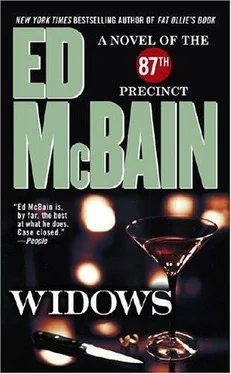Ed McBain - Widows
Здесь есть возможность читать онлайн «Ed McBain - Widows» весь текст электронной книги совершенно бесплатно (целиком полную версию без сокращений). В некоторых случаях можно слушать аудио, скачать через торрент в формате fb2 и присутствует краткое содержание. Жанр: Полицейский детектив, на английском языке. Описание произведения, (предисловие) а так же отзывы посетителей доступны на портале библиотеки ЛибКат.
- Название:Widows
- Автор:
- Жанр:
- Год:неизвестен
- ISBN:нет данных
- Рейтинг книги:3 / 5. Голосов: 1
-
Избранное:Добавить в избранное
- Отзывы:
-
Ваша оценка:
- 60
- 1
- 2
- 3
- 4
- 5
Widows: краткое содержание, описание и аннотация
Предлагаем к чтению аннотацию, описание, краткое содержание или предисловие (зависит от того, что написал сам автор книги «Widows»). Если вы не нашли необходимую информацию о книге — напишите в комментариях, мы постараемся отыскать её.
Widows — читать онлайн бесплатно полную книгу (весь текст) целиком
Ниже представлен текст книги, разбитый по страницам. Система сохранения места последней прочитанной страницы, позволяет с удобством читать онлайн бесплатно книгу «Widows», без необходимости каждый раз заново искать на чём Вы остановились. Поставьте закладку, и сможете в любой момент перейти на страницу, на которой закончили чтение.
Интервал:
Закладка:
"No. I put an ad in the paper."
"Was Susan Brauer the one who answered the newspaper ad?"
"Yes."
"I mean personally," Brown said. "Was she the one who wrote ... or called . . .?"
"She called me, yes."
"She herself? Not anyone calling for her? It wasn't a man who called, was it?"
"No, it was Miss Brauer."
"What happened then?" Brown asked.
"We arranged to meet at the apartment. I showed it to her, and she liked it, and we agreed on the rent, and that was it."
"Did she sign a lease?"
"Yes."
"For how long?"
"A year."
"And when was this?" Kling asked.
"In February."
Fast worker, Kling thought. He meets her on New Year's Day, and he's got her set up in an apartment a month later. Brown was thinking the same thing.
"I don't know what to do now that she . . . well, it's just a terrible tragedy, isn't it?" Mrs Brackett said. "I suppose I'll have to contact my lawyer. The man who drew the lease. I guess that's the thing to do."
"Yes," Kling said.
"Yes," Brown said. "Mrs Brackett, I want to make sure we've got this absolutely right. You were renting the apartment directly to Miss Brauer, is that right?"
"Yes. She sent me a check each month. To this address."
28
"No middleman," Brown said.
"No middleman. That's the best way, isn't it?" she said, and smiled again.
"Do you know anyone named Arthur?" Kling asked.
"No, I'm sorry, I don't."
"Did Miss Brauer ever introduce you to anyone named Arthur?"
"No. I only saw her once, in fact, the day we met at the apartment. Everything since then has been through the mail. Well, several times we spoke on the telephone, when she ..."
"Oh? Why was that?"
"She needed to know how to work the disposal . . . there's a switch on the wall . . . and she wanted the combination to the wall safe, but I wouldn't give her that."
"Did she say why she wanted the combination?"
"No. I assume to put something in the safe, wouldn't you guess?"
I would guess, Kling thought.
Like twelve grand, Brown thought.
"Thank you very much for your time," Kling said. "We appreciate it."
"Some more lemonade?" she asked.
Outside, the little girls kept splashing in the pool.
Thomas Mott was a man in his late forties, early fifties, with stark white hair, deep brown eyes, and a face that seemed carved from alabaster. Brown guessed his height at five-eight, his weight at a hundred and forty. Slender and slight, wearing skintight black jeans, a red cotton sweater, and black loafers without socks, he flitted among the treasures in his Drittel Avenue shop like a dancer in a Russian ballet. Brown wondered if he was gay. There was something almost too delicate about the way he moved. But he was wearing a narrow gold wedding band.
Kling could not have named or dated any of the antiques here if he were being stretched on a rack or roasted on a spit, but he knew he was in the presence of objects of extreme
29
beauty. Burnished brass and wood rubbed to a gleaming patina, tiny clocks that ticked like chickadees, stately clocks that tocked in counterpoint, beautiful bottles in ruby reds and emerald greens, silver-filigreed boxes and bronze lamps with stained-glass shades that glowed with vibrant color. There was a hush in the place. He felt as if he were in an ancient cathedral.
"Yes, of course I know her," Mott said. "A terrible shame, what happened to her. A lovely person."
"Why'd she come in here on the ninth?" Brown asked.
"Well, she was a customer, she stopped by every now and then, you know."
"But was there something special about the ninth?" Kling asked. He was thinking of those exclamation points.
"No, not that I can remember."
"Because her appointment calendar made it look like something important," Kling said.
"Well, let me see," Mott said.
"How well did you know her?" Brown asked, biting the bullet.
"As well as I knew any of my customers."
"And how well was that?"
"As I said, she came in every now and ..."
"Well enough to call you Tommy?"
"All my customers call me Tommy."
"When was the last time she came in?"
"Last week sometime, I suppose."
"Would it have been last Monday?"
"Well, I..."
"The ninth?"
"I suppose it could have been."
"Mr Mott," Kling said, "we've got this idea that Miss Brauer felt it was important for her to come in here last Monday. Would you happen to know why?"
"Oh," he said.
Comes the dawn, Brown thought.
"Yes, now I remember," Mott said. "The table."
30
"What table?"
"I'd told her I was expecting a butler's table from England ..."
"When did you tell her that, Mr Mott?"
"Well. . . last month sometime. She came in sometime last month. As I told you, she stopped by every ..."
"Every now and then, right," Brown said. "So when she was in last month, you mentioned a butler's table to her ..."
"Yes, that was coming from England on or about the ninth, was what I told her."
"What kind of table is that?" Kling asked. "A butler's table?"
"Well, it's a ... I'd show it to you, but I'm afraid it's already gone. This was solid cherry, quite a good buy at seventeen hundred dollars. I thought she might be able to find a place for it in her apartment. She jotted down the date I was expecting it, and said she'd give me a call."
"But instead she came to the shop."
"Yes."
"On Monday the ninth," Kling said.
"Yes."
"So that's what was so urgent," Brown said. "A cherrywood butler's table."
"A quite beautiful piece," Mott said. "She couldn't use it . . . from what I was able to gather, she was renting a furnished apartment . . . but it went in a minute. Well, only seventeen hundred dollars," he said, and raised his eyebrows and moved his hands in an accompanying extravagant gesture.
"What time did she come in here?" Kling asked. "Last Monday."
"It was toward noon. Shortly before noon. Sometime between eleven-thirty and twelve o'clock."
"You remember, huh?" Brown said.
"Yes. It was about that time." As if on cue, somewhere in the shop a clock began chiming the hour. "A Joseph Knibb," Mott said, almost idly. "Quite rare, quite valuable, such lovely chimes."
31
The clock chimed six times.
Mott looked at his watch.
"Well, I guess that's it," Brown said. "Thanks a lot, Mr Mott."
"Thanks," Kling said.
The moment they were out on the street again, Brown said, "You think he's gay?"
"He was wearing a wedding band."
"I caught it. That doesn't mean anything."
"What's a butler's table?" Kling asked.
"I don't know," Brown said, and looked up at the sky. "I hope Carella gets good weather tomorrow," he said.
Deputy Inspector William Cullen Brady was telling the trainees that he took no credit for organizing the hostage negotiating team. Listening to him, Eileen felt uncomfortable because she thought she was overdressed.
This was the first meeting of the training class.
Thursday morning, the nineteenth day of July. Nine o'clock.
For work she'd normally have worn either slacks or a wide skirt, comfortable shoes, big tote bag - unless they were dolling her up for the street. But she hadn't decked herself out as a decoy since the night she'd killed Robert Wilson. Bobby. She supposed that was known as shirking the work. Not precisely doing the job for which she was getting paid. Which was why she was here today, she guessed. So she could go back to doing an honest job someplace in the department.
She was wearing a simple suit, brown to complement her red hair and green eyes, tan blouse with a stock tie, sand-colored pantyhose, low-heeled pumps, fake alligator-skin bag. Service revolver in the bag, alongside the lipstick. Overdressed for sure. The only other woman in the room, a tiny brunette with a hard, mean look, was wearing jeans and a white cotton T-shirt. Most of the men were dressed casually, too. Slacks, sports shirts, jeans, only one of them wearing a jacket.
Читать дальшеИнтервал:
Закладка:
Похожие книги на «Widows»
Представляем Вашему вниманию похожие книги на «Widows» списком для выбора. Мы отобрали схожую по названию и смыслу литературу в надежде предоставить читателям больше вариантов отыскать новые, интересные, ещё непрочитанные произведения.
Обсуждение, отзывы о книге «Widows» и просто собственные мнения читателей. Оставьте ваши комментарии, напишите, что Вы думаете о произведении, его смысле или главных героях. Укажите что конкретно понравилось, а что нет, и почему Вы так считаете.












